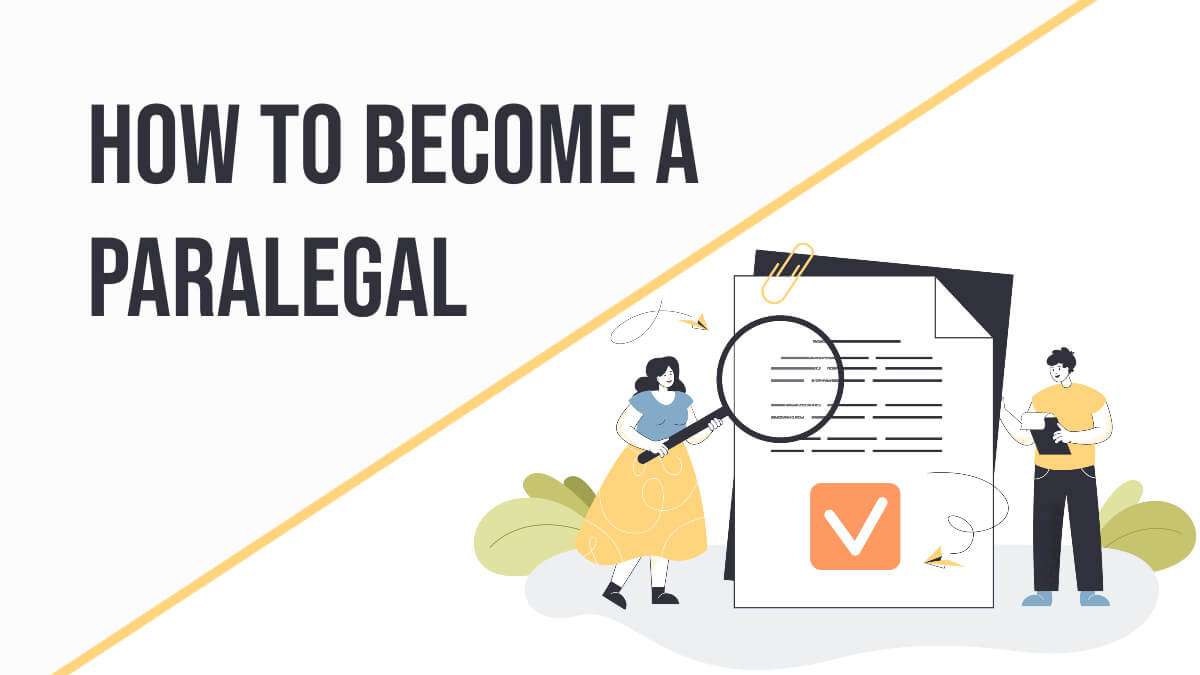
Do you know how to become a Paralegal? A paralegal works with lawyers to help them with cases. Paralegals do research and write reports for lawyers to use in their work. This could be to defend a person in a court case going to trial or give information at a city council meeting.
Paralegals can’t work independently; they have to work under the supervision of a lawyer. They can’t give legal advice and can’t work alone, but they can work in various places, such as law firms, government agencies, businesses, and nonprofits.
Also, you can able to know,
What is a Paralegal?
With frequent collaboration with attorneys and solicitors, paralegals play a significant part in the legal sector.
Except for a few “reserved activities” only lawyers are permitted to conduct, paralegals are trained and schooled to carry out various legal obligations. They may assist in many legal situations in place of attorneys.
In addition to employment in the legal field, paralegals may work in a wide variety of businesses, including journalism, entertainment, fashion, and government.
Due to their ability to provide various legal services, many paralegals now work as licensed practitioners and run their paralegal firms.
Step by Step Guide for How to Become a Paralegal
Here are some steps that most people take to become a paralegal. Once you know what it takes to be a paralegal, you can start getting ready for a job in the field. Let’s get started.
Read more: How to Become a Counselor Without a Degree
Step 1: Get the Education you need to be a Paralegal.
Paralegals are not licensed at the national level, demonstrating there are no federal rules about how they should do their jobs.
They are not directly regulated at the state level, except in a few states. Even though it’s not required in all 50 states, several professional groups offer paralegals certification.
Employers set the requirements for hiring paralegals because there are no state or federal rules. At the very least, to become a paralegal, you need to have some formal education. You might want to try to get one of the following:
An associate degree in paralegal studies. Most individuals take about two years to finish an associate degree. The minimum requirements for getting into a school vary from school to school, but a high school diploma is usually one of them.
A bachelor’s degree in law is similar. Usually, it takes four years to finish a bachelor’s degree. The National Federation of Paralegal Associations (NFPA) demonstrates getting at least a bachelor’s degree is becoming more critical to employers.
A master’s degree in legal studies. You might want to get a master’s degree if you already have a bachelor’s degree. A master’s degree in legal studies (MLS) can include classes like negotiation, intellectual property law, employment law, legal writing, and trial advocacy. These may give graduates the skills they need to work as paralegals or in another legal field.
People who want to change careers or who have special lifestyle needs may wish to enroll in an online Master of Legal Studies program. This gives you the freedom to work while getting your degree.
As you plan your path to a graduate degree, you may decide to take part in programs that the American Bar Association has approved (ABA). When you look at your top program choices and consider standard paralegal requirements, ABA rules might be helpful.
Step 2: Choose an Area of Expertise
When thinking about how to become a paralegal, you can choose from several specializations. If you want a master’s degree, you can choose from the many legal studies concentration programs all over the country offer.
These allow you to focus on a particular area of law. Different majors can lead to different kinds of jobs. As an example:
- Litigation paralegals help trial lawyers with investigations, pleadings, and discovery, among other parts of a trial.
- Paralegals in the government work for regulatory agencies, law enforcement, or with politicians.
- Estate planning and probate paralegals talk to families, tax auditors, tax lawyers, and trustees about the estates they handle.
- Labor law paralegals work on problems between employers and employees, like discrimination or lousy working conditions.
If you don’t wish to work for the government, you can look for jobs in the private sector in real estate, hospitals, social work, human resources, or other fields. Of course, paralegals can also work in law firms or for corporations.
Step 3: Get a Certification as a Paralegal (Recommended)
In addition to your education, you take a test to get certified as a paralegal. Several professional groups offer certifications for paralegals.
You can get a paralegal certification in several ways, including, but not limited to:
- The National Association of Legal Assistants gives the Certified Paralegal certification (NALA).
- NALA also gives the Advanced Certified Paralegal (ACP) certification.
- The certification comes from NALS, a national organization for legal professionals.
Don’t forget that you don’t need a license to be a paralegal. But you are going after one is encouraged. So, getting a certification may help you get a job.
That’s because a certificate shows some employers that you know your stuff and are dedicated to your field.
Aside from certification, paralegals follow specific professional standards. Some employers use the measures to determine how ready a paralegal is.
These qualifications are not required by law, but they are meant to show the attorney and the public that you have a formal education in law and have been exposed to various issues you may face as a paralegal.
Each certification has its requirements for continuing education and renewal, so it’s important to know what these are and choose a certificate that fits your goals.
Step 4: Meet the Requirements for Paralegals at the State level (Optional)
You may also want to look into state-level certifications to become a paralegal. Most of these certifications are optional and are given out by local paralegal associations.
Some states, like California, Florida, Texas, and Utah, have their requirements for certification. Because of this, it’s essential to determine the criteria for being a paralegal in the state you want to work.
Texas: The State Bar of Texas has a Paralegal Division, and certification through the Texas Board of Legal Specialization is optional.
Utah: In Utah, candidates for licensed paralegal practitioner must have 1,500 hours of law-related work within the last three years, pass a professional ethics test, and take a Licensed Paralegal Practitioner Exam for each of their desired practice areas. This is in addition to meeting the educational and professional certification requirements established by the courts of Utah.
You’ll want to ensure that the information for your state of choice is up to date.
Step 5: Work as a Paralegal for a while and look for a Job.
Students in several accredited degree programs get help finding internships. This internship gives students a chance to put their theoretical knowledge to use in a real-world setting, showing that they understand legal principles and can work as paralegals in the real world.
Internships can also be a good way for students to make connections that could lead to full-time jobs after graduation.
After getting their degree, paralegals may be able to work for private law firms or in the legal departments of large companies.
And also, they can work for state and federal government agencies, public defenders’ offices, district attorneys’ offices, and consumer groups in the public sector.
In the future, paralegals might want to keep learning or get new certifications so they can apply for more advanced jobs or be given more responsibilities on the job.
Read more: How to Become a Contortionist
How Do They Help Lawyers?
So, what does a paralegal do? Paralegals’ work is complex and can be very long, so they need to know much about the law.
Lawyers rely on their paralegals, and most of the time, the success of a case depends on how well the lawyer and their support staff work together.
- Paralegal responsibilities may include:
- Getting an attorney ready for a hearing or trial by looking into the case’s facts
- Getting together and arranging documents that are directly related to the case
- Researching past court cases to help set a standard
- Putting together motions, plea deals, and reports
- Having interviews with clients or witnesses
- Putting together legal documents like contracts, mortgages, wills, etc.
Even though paralegals work in the legal field, some jobs aren’t part of their job description and should be done by the attorneys who supervise them. Most of the time, paralegals are not allowed to “practice law.”
In other words, they aren’t allowed to do things that need a license. A paralegal is not permitted to give legal advice, decide which cases to take or not take, or represent clients at a hearing or trial.
Best Skills Required for Paralegals
Paralegals do their jobs by using a mix of hard and soft skills. Keeping these skills up-to-date could be good for your career.
Whether you want to get a master’s degree in legal studies or a certificate, you should learn about paralegals’ skills.
Here are some skills that paralegals often use:
# Organization skills
# Look into the law
# How well can you read?
# Paying attention
# judging and making decisions
# Writing for law
# Think carefully
# Emotional intelligence
# Complex problem-solving
# Talking in public
Read more: How to Become a Genetic Counselor
Conclusion
It’s an excellent job for people who like the law and want to help people get the legal help they need. If you need to be a paralegal, you’ll get to work in a fun and challenging environment doing a wide range of legal administrative tasks.
This is essential work for a team of lawyers and other paralegals to do well.
Now you may have an idea about how to become a Paralegal. To find a job as a paralegal, you’ll need to go to a school for paralegal studies and graduate from it.
But don’t worry you can choose from many great schools to get your associate’s degree in paralegal studies and move on with your career.












